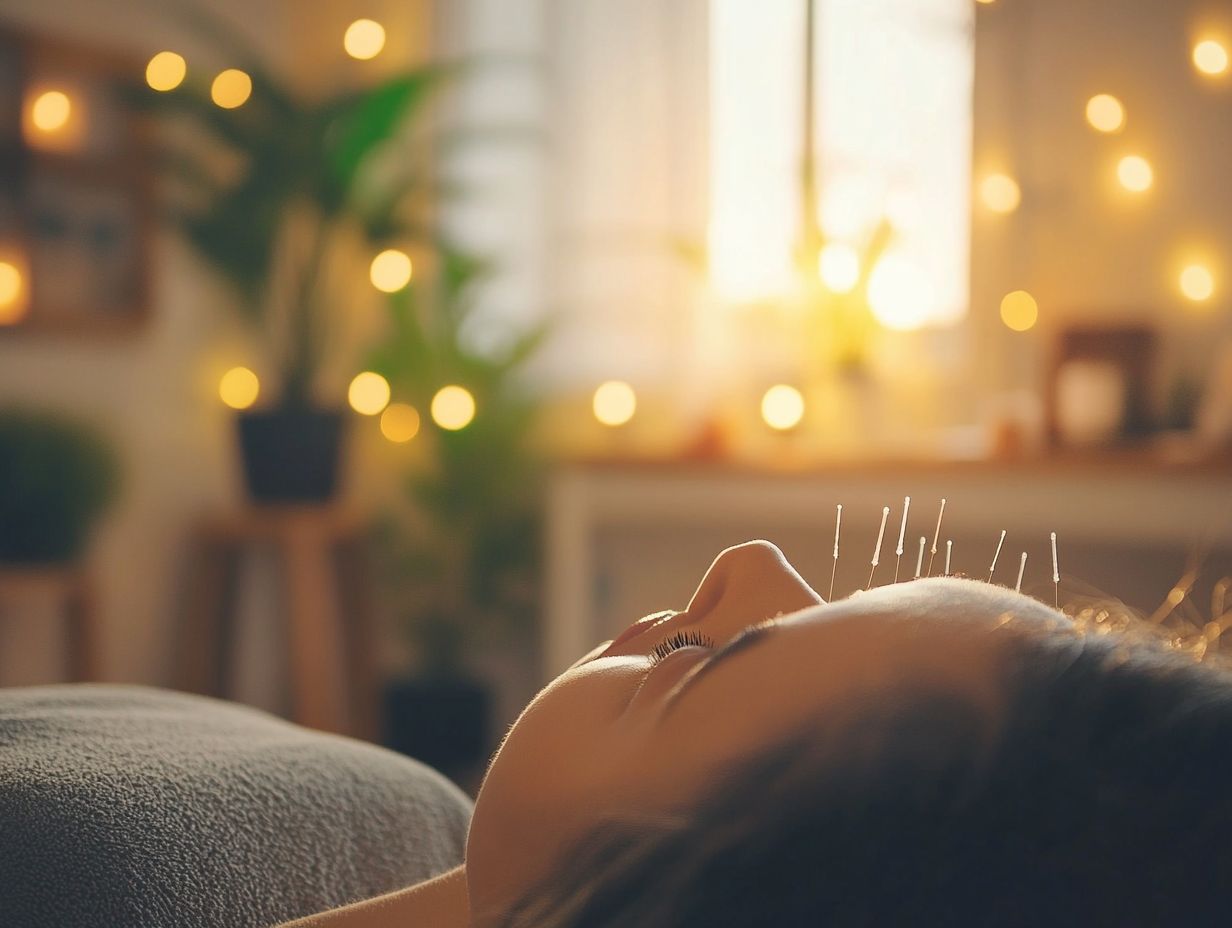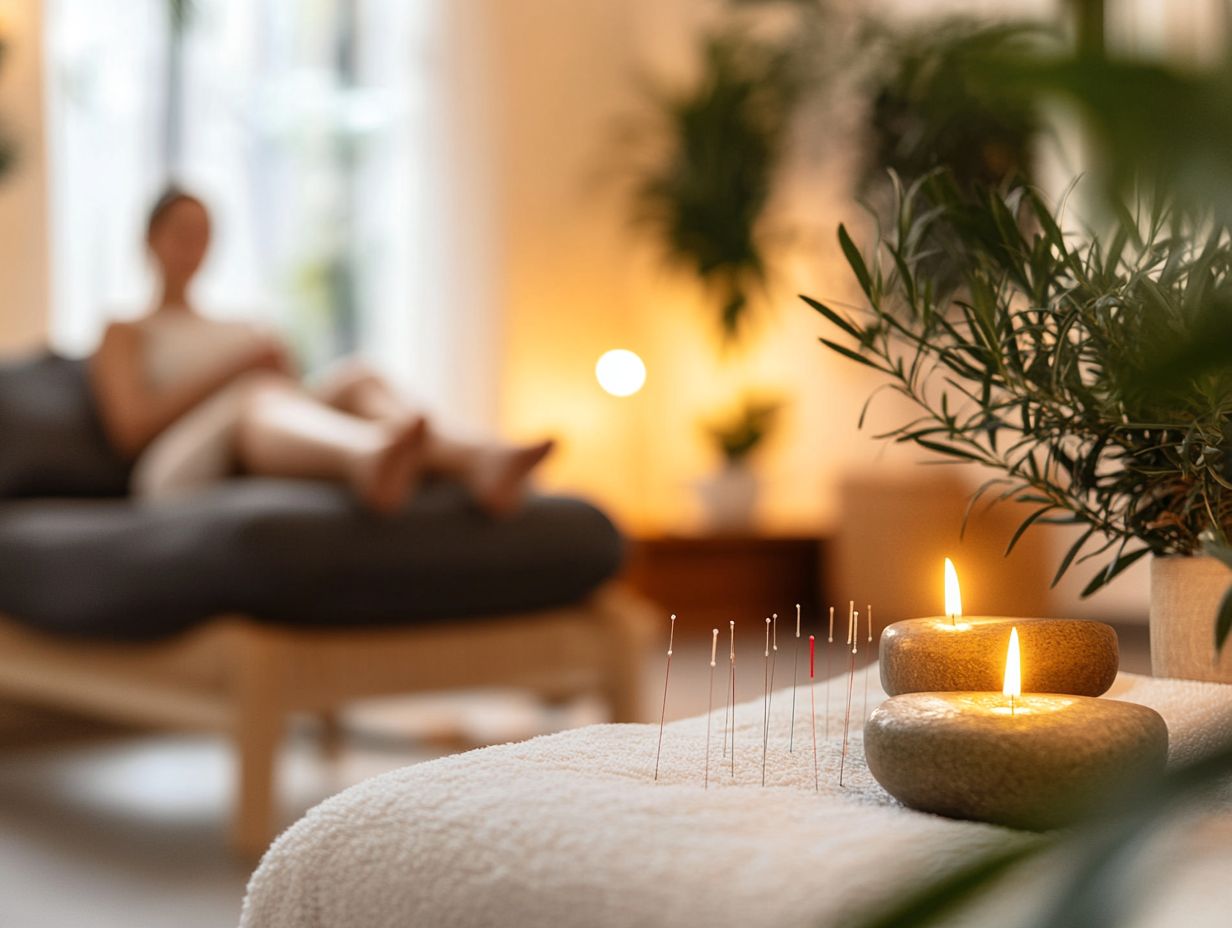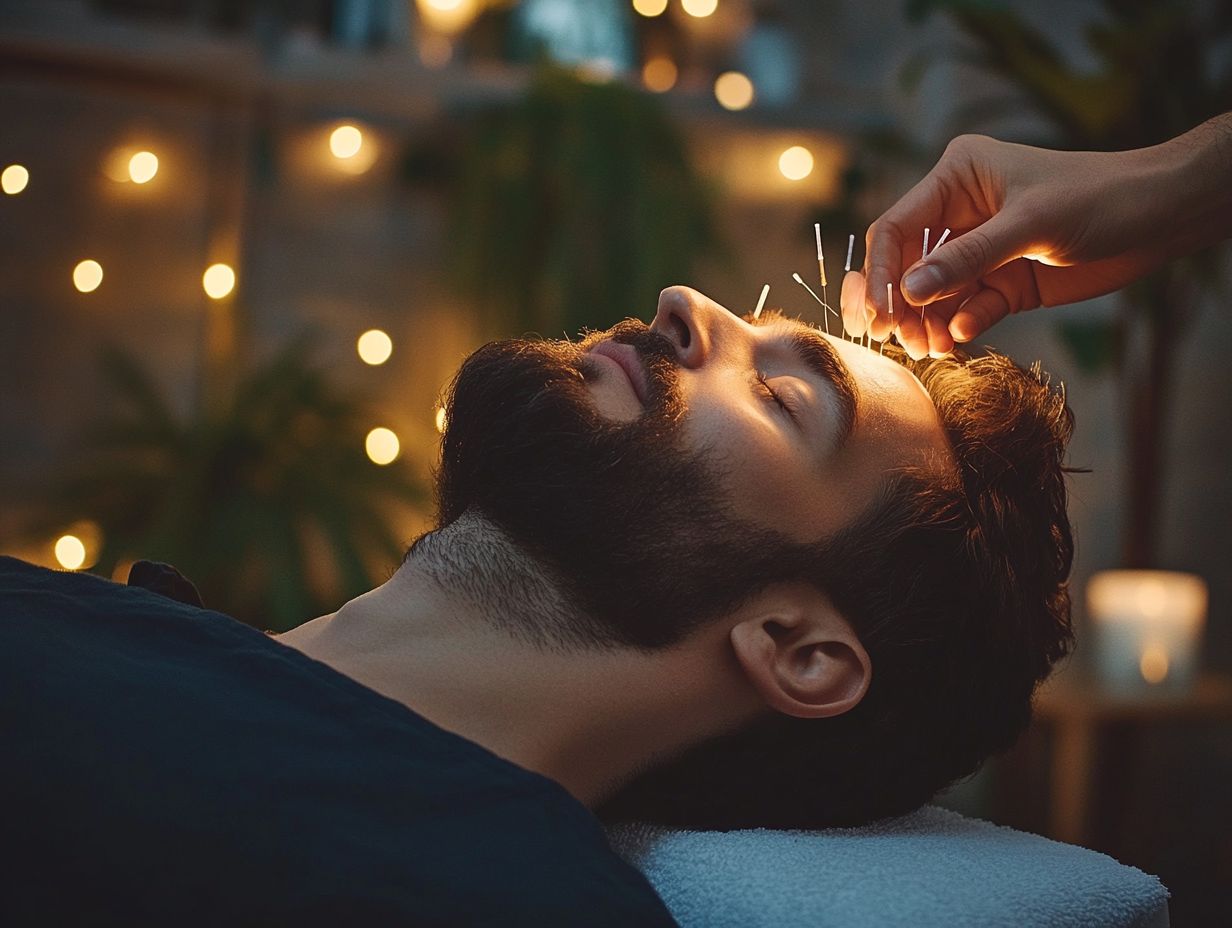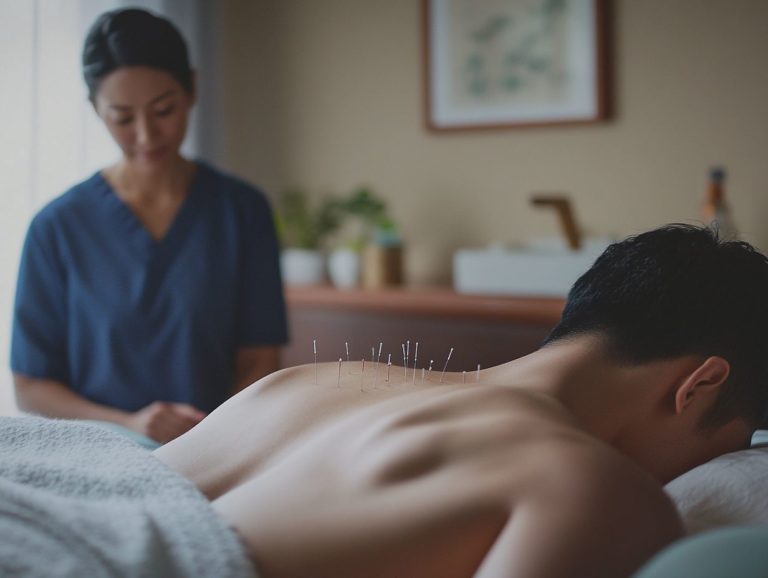How Acupuncture Supports Overall Wellbeing
Ready to explore an ancient therapy that can boost your health? Acupuncture, a cornerstone of Traditional Chinese Medicine (TCM), has garnered global recognition for its holistic approach to health.
This ancient practice addresses physical ailments and supports mental wellness, making it an invaluable addition to your health regimen.
Delve into the rich history and principles that underpin acupuncture. Uncover its numerous benefits and its effectiveness in treating a wide array of conditions.
Understand what to expect during a session. Learn how to seamlessly incorporate acupuncture into your wellness routine. Discover how this time-honored therapy can elevate your overall well-being.
Contents
- Key Takeaways:
- Understanding Acupuncture
- Benefits of Acupuncture
- Conditions Treated with Acupuncture
- How Acupuncture Works
- What to Expect During an Acupuncture Session
- Incorporating Acupuncture into a Wellness Routine
- Frequently Asked Questions
- 1. How does acupuncture benefit overall wellbeing?
- 2. What are the specific benefits of acupuncture for overall wellbeing?
- 3. Is acupuncture safe for overall wellbeing?
- 4. How many acupuncture sessions are typically needed to support overall wellbeing?
- 5. Are there any side effects of acupuncture for overall wellbeing?
- 6. Can acupuncture be used in conjunction with other forms of healthcare for overall wellbeing?
Key Takeaways:

Acupuncture has been used for centuries in Traditional Chinese Medicine to promote balance and harmony within the body, leading to the benefits of regular acupuncture treatments and improved overall well-being.
This therapy treats physical ailments and offers mental health benefits, such as reducing stress and anxiety, as well as promoting relaxation and mental clarity.
By stimulating specific points on the body and balancing the flow of Qi, acupuncture effectively treats a wide range of common ailments and symptoms, making it a versatile and holistic form of treatment for overall well-being.
Understanding Acupuncture
Acupuncture invites exploration of its essence as an important Traditional Chinese Medicine (TCM) practice. It highlights the vital role of qi flow in enhancing overall wellness.
This ancient practice has garnered global acclaim for its remarkable capacity to address various health concerns. It helps alleviate chronic pain, reduce insomnia, foster emotional balance, and lower stress.
By harmonizing the body’s energy pathways, acupuncture promotes effective healing and restores a profound awareness of health within you.
History and Principles of Traditional Chinese Medicine
The history of Traditional Chinese Medicine (TCM) is rich and intricate, stretching back thousands of years and encompassing various practices, including the renowned art of acupuncture.
As you explore the delicate balance of yin and yang, you ll uncover how these opposing forces intricately influence your health and well-being.
Central to TCM is the concept of qi, often described as the vital life force that flows through your body along specific pathways known as energy pathways.
These energy pathways act as crucial junctions in the acupuncture system, where the gentle insertion of needles helps restore harmony and alleviate various ailments.
Historical texts, such as the Huangdi Neijing, have laid the groundwork for these principles, highlighting their significance not only in ancient times but also in modern holistic health approaches.
Today, many people look for natural remedies and preventive care, embodying the timeless wisdom of TCM.
Benefits of Acupuncture
Acupuncture presents a multitude of benefits, enhancing both physical and mental well-being. This makes it an exceptional option for individuals seeking how to incorporate acupuncture into your wellness plan with comprehensive, holistic therapies.
Physical and Mental Health Benefits
The physical and mental health benefits of acupuncture are well-documented. Its effectiveness in managing chronic pain and providing relief from insomnia stands out prominently.
Acupuncture also plays a crucial role in reducing chronic inflammation, making it a compelling option for those dealing with autoimmune disorders.
Many individuals report significant relief from headaches, including migraines and tension headaches, thanks to targeted needle placements.
On the mental health side, acupuncture’s ability to lower stress levels and promote emotional balance is gaining recognition. Its impact on immune health offers a holistic approach to overall well-being.
If you’re seeking relief from anxiety or depression, regular sessions can help stabilize your mood. This enhances your quality of life while reducing reliance on pharmaceuticals.
Conditions Treated with Acupuncture

Acupuncture proves to be remarkably effective in addressing a wide range of conditions, from chronic pain and insomnia to menstrual cramps and anxiety.
This ancient practice stands as a valuable asset in contemporary healthcare, offering holistic solutions that many find beneficial.
Don t wait to experience the benefits of acupuncture. Start your path to better health today!
Common Ailments and Symptoms
Acupuncture can help with many common issues. These include chronic pain, anxiety, allergic asthma, nausea, and migraines.
This ancient practice does more than just ease physical discomfort. It addresses emotional and psychological challenges, providing whole-person care.
Studies suggest that acupuncture can significantly reduce chronic pain conditions. This includes lower back pain and arthritis, helping you regain a better quality of life.
If you’re struggling with anxiety, regular sessions may improve your mood and reduce stress. This is likely due to the release of endorphins and other helpful hormones.
Research shows acupuncture can effectively manage allergic asthma. It can lower both the frequency and severity of attacks, guiding you toward relief and overall well-being.
How Acupuncture Works
Acupuncture works by stimulating specific points on your body. These points, called acupoints, are along energy pathways that help balance your life force, also known as qi.
Stimulating Acupoints and Balancing Qi
Stimulating acupoints improves the flow of qi. This promotes balance in your energy pathways and contributes to better health.
For example, LI4 is found between your thumb and index finger. It helps alleviate headaches and reduce stress.
ST36 is located just under your knee and is known to boost immunity and improve digestion.
Points like PC6 can ease nausea. Targeted stimulation addresses symptoms and restores harmony in your body s energy systems.
By learning about these acupoints, you can make the most out of acupuncture for your health.
What to Expect During an Acupuncture Session
In an acupuncture session, skilled practitioners guide you through the process. They use various techniques to ensure a comfortable and calming experience.
Process and Techniques Used

The acupuncture process involves carefully inserting needles at specific acupoints. Techniques are tailored to your individual needs and treatment goals.
Manual acupuncture is a straightforward method where practitioners insert the needles by hand. This approach directly addresses your concerns.
Electroacupuncture adds small electrical currents to the needles for enhanced stimulation and greater therapeutic effects.
Auricular acupuncture focuses on the ear, offering unique benefits, especially for those dealing with addiction or emotional issues.
Each acupuncture technique varies in application, showcasing the versatility of this holistic treatment option.
Incorporating Acupuncture into a Wellness Routine
Bringing acupuncture into your wellness routine can elevate your health. It aligns seamlessly with your wellness goals and promotes a balanced approach to integrative medicine.
Combining with Other Treatments for Optimal Results
Combining acupuncture with other treatments can lead to optimal results. This approach offers comprehensive pain relief and enhances the effectiveness of each therapy.
Integrating methods such as physical therapy, medications, and lifestyle changes can better equip you to tackle health challenges. This synergy enables practitioners to customize treatments that not only alleviate symptoms but also promote overall well-being.
For example, pairing acupuncture with physical therapy can boost muscle recovery and flexibility. Dietary adjustments can further support healing and prevent future issues.
Practices like yoga can also enhance these treatments. This integrative approach empowers you to take charge of your wellness journey.
Frequently Asked Questions
1. How does acupuncture benefit overall wellbeing?
Acupuncture is based on the belief that our bodies have a natural flow of energy, known as life energy, that when disrupted can lead to illness and discomfort. Acupuncture works by restoring this flow, helping to alleviate physical and emotional symptoms while promoting overall wellbeing.
2. What are the specific benefits of acupuncture for overall wellbeing?

Acupuncture has been shown to reduce stress, improve sleep, boost immunity, and promote relaxation. It can also provide relief from chronic pain and help with mental health concerns such as anxiety and depression.
3. Is acupuncture safe for overall wellbeing?
Experience the safe and effective relief that acupuncture can bring when performed by a licensed practitioner. The use of sterile and disposable needles ensures the safety and effectiveness of the treatment.
4. How many acupuncture sessions are typically needed to support overall wellbeing?
The number of acupuncture sessions needed can vary depending on individual needs and conditions. Some people may feel relief after just one session, while others may require multiple sessions for long-term benefits.
Your acupuncturist will work with you to develop a personalized treatment plan.
5. Are there any side effects of acupuncture for overall wellbeing?
Some people may experience mild side effects such as bruising, soreness, or temporary worsening of symptoms after an acupuncture session. However, these side effects are temporary and typically subside within a day or two.
It is important to communicate any concerns with your acupuncturist during the treatment process.
6. Can acupuncture be used in conjunction with other forms of healthcare for overall wellbeing?
Absolutely! Acupuncture is often used as a complementary therapy alongside other forms of healthcare, such as traditional medicine, physical therapy, and mental health counseling. It can enhance the effectiveness of these treatments and support overall wellbeing in a holistic manner.






